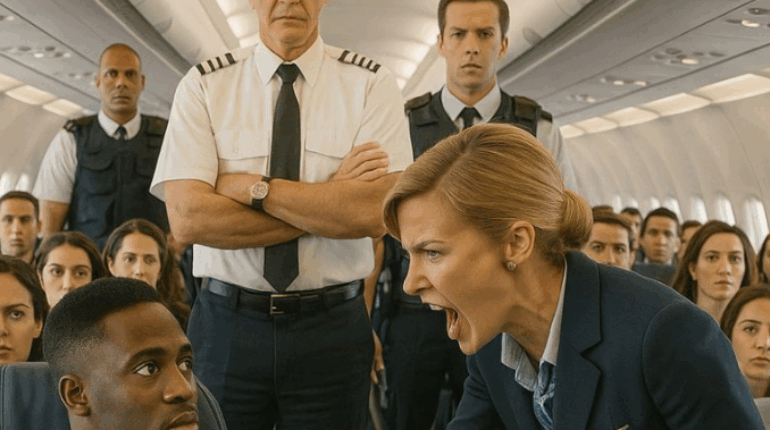📌 CEO Denied a First-Class Meal — His Next Move Shook an Entire Airline

Posted 26 September 2025 by: Admin
Sometimes it only takes a small spark to ignite a reckoning. For Michael Carter, what began as a denied meal on a first-class flight turned into a battle for respect, accountability, and systemic change that reached far beyond one cabin in the sky.
Michael Carter adjusted his tailored navy suit before settling into his first-class seat aboard American Skyways Flight 782 from Dallas to New York. At 45, Michael was the CEO of a rapidly expanding logistics technology company that had just gone public. Despite his success, he traveled discreetly, indulging only in first class for the space to work in peace.
As the plane reached cruising altitude, flight attendants began serving meals. Michael, who had reserved and paid extra for a seared salmon entrée days earlier, expected a smooth experience.
But when the attendant reached his row, she hesitated.
“I’m sorry, sir. We’ve run out of the salmon. Only pasta remains.”
Michael frowned. “That’s impossible. I pre-booked salmon.”
Her tone sharpened. “It’s not available anymore. You’ll have to take the pasta.”
Moments earlier, the passenger beside him had been served salmon. Michael calmly asked why his meal had been given away. The attendant leaned closer. “Sir, calm down and accept what we have.”
Michael wasn’t yelling, just questioning—but her posture painted him as a problem.
What followed went beyond food—it was about respect.
Later, when Michael requested sparkling water, the attendant slammed it onto his tray, spilling it slightly. The gesture wasn’t lost on fellow passengers, who exchanged uneasy glances.
Michael stayed composed, though inside frustration simmered. It wasn’t about the salmon—it was the dismissal, the condescension, the quiet prejudice he had endured all his life.
But Michael wasn’t just any passenger. His company, TransWay Technologies, managed major logistics contracts with American Skyways itself. This wasn’t only about dignity—it was about business.
From his seat, he drafted a precise email to corporate relations: the denied meal, the slammed glass, the disrespect. At the end, he warned: TransWay would reevaluate its multimillion-dollar contracts unless corrective action was immediate.
Within an hour, his phone rang. Richard Levinson, the airline’s VP of Corporate Relations, spoke nervously. “Michael, we take this very seriously.”
Michael’s response was firm. “This isn’t about food—it’s about professionalism. I’ve built my company on accountability. I expect the same from yours.”
By the time the plane landed, Michael had already made up his mind.
A voucher or apology wouldn’t cut it. He had the leverage to demand real change, and he intended to use it.
Days later, The Wall Street Journal ran the headline: “Black CEO Sparks Shake-Up at American Skyways After First-Class Dispute.”
The airline confirmed the entire crew of Flight 782 had been dismissed, citing an investigation. Internally, sources admitted it was less about principles and more about preserving contracts worth millions.
The reaction was polarizing. Many praised Michael for standing against bias, calling it a wake-up call for an industry infamous for discrimination. Others criticized him for overreaching, claiming he had destroyed frontline workers’ jobs.
At a press conference, Michael clarified: “This was never about food. It was about dignity. When professionalism is abandoned, when bias clouds judgment, it erodes trust. And trust is the foundation of every business relationship.”
Asked if he felt guilty about the crew losing their jobs, his answer was unwavering: “I didn’t fire anyone—the airline did. But contempt has consequences. In my company, and in theirs.”
What began with salmon ended as a reckoning.
American Skyways soon introduced new staff training, stricter oversight, and diversity initiatives. Whether the reforms would last remained uncertain, but the shockwave was undeniable.
For Michael, the incident was personal yet symbolic. He knew countless others endured similar treatment without the platform or power to push back. On Flight 782, he had stood not only for himself but for the principle that silence should never be the price of entry.
A denied meal had exposed much more—a system that needed to be held accountable.




















